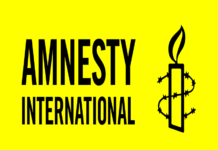A new report released by Amnesty International on Wednesday has revealed that Turkey and Iran pushed back large numbers of Afghan asylum seekers who were trying to cross their borders.
According to the report, both countries resorted to disproportionate measures, such as opening fire on men, women and children, to keep asylum seekers out of their territory. Furthermore, both countries’ security officers often mistreated detained asylum seekers.
The report was based on research conducted by Amnesty International that involved interviewing 74 asylum seekers who were pushed back to Afghanistan. Among them, 48 said they were shot at by security forces at the border. In total Amnesty documented 255 cases of unlawful pushbacks from March 2021 to May 2022.
Witnesses told Amnesty researchers they saw three children and an adult being shot to death by Turkish border guards.
“They didn’t shoot into the air but aimed directly at us,” said a man identified as Arif, who tried to flee the Taliban by entering Turkey. “I saw a woman and her two children get injured. I also saw a 2-year-old and a 6-year-old being shot. It was terrifying.”
Marie Forestier, Amnesty International’s advisor on refugee and migrant rights in the Middle East and North Africa, said such killings could be categorized as “extrajudicial killings” as the victims had not opened fire on the security officers or posed any danger. Therefore, those officers who were responsible should be held accountable.
“The dangers asylum seekers face do not stop at the border,” Forestier
added. “Many Afghans we spoke to told us they were arbitrarily detained and subjected to severe mistreatment in both countries.”
A man identified as Hamid said he was detained with his friends at the border and that they were severely beaten.
“We were beaten with the butts of guns, and an officer sat on one of my friends and smoked a cigarette,” he said.
According to Amnesty, Turkey sent many Afghans back without registering their asylum applications, which put them in further danger once they returned to Afghanistan. The Turkish Presidency of Migration Management said on their website that 6,805 Afghans were sent back on charter planes.
Amnesty argued that most of them were not voluntary returns and said one man had killed himself after finding out he was being sent back.
One anonymous asylum seeker said he was forced to sign a voluntary return form by Turkish authorities although he clearly told them his life was in danger in Afghanistan. “They didn’t care. I was beaten and pushed against a wall. One man sat on me while the other forced my finger on a form, and with that fingerprint I had signed the document,” he explained.
Sending people to a country where they face a real risk of persecution, including torture, is prohibited under international law. Within international refugee law the prohibition on returning a person to a country in which they may face persecution is known as the principle of nonrefoulement. Turkey is bound by these prohibitions both as a matter of customary international law and treaty law.
Amnesty called on the international community to cooperate with Turkey and Iran to ensure the safety of all asylum seekers. It also urged Europe to ensure that the funding they provide to Turkey to take care of asylum seekers was not in any way used in situations where their rights were violated.
Turkey hosts the world’s largest number of refugees, 3.7 million from Syria granted temporary protection status, and over 400,000 refugees and migrants from Afghanistan, Iraq and other countries
However, after the Taliban took control of Kabul in August 2021, Turkish politicians and members of the public have expressed reluctance to accept more asylum seekers.
Turkish President Recep Tayyip Erdoğan in an earlier statement said Turkey could no longer afford to welcome any more Afghan refugees.
According to a survey conducted by Metropoll, 54.4 percent of Turks are against opening the border to Afghan refugees fleeing the Taliban and think a possible open-door policy would have a negative effect on their support for the Turkish government.
In an interview with the Stockholm Center for Freedom, Member of the European Parliament Tineke Strik saidTurkey cannot be considered a safe country for migrants and asylum seekers. “The biggest problem concerning Turkey is that it is not bound by the refugee convention when it comes to non-European refugees.”















